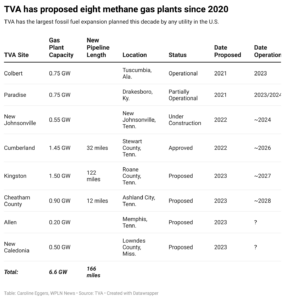
Earth is about to finish the hottest year on record — and it was marked by deadly heat, droughts, floods and disease outbreaks. Marine heat waves covered nearly half the planet, and the global ocean temperature was the hottest in modern history, by a lot.
Fossil fuels are the main driver of all of this heat. In 2023, world leaders agreed, vaguely, to stop the burning of fossil fuels. But the industry expanded in Tennessee this year.
It started in January. The Tennessee Valley Authority, which supplies nearly all electricity in the state, announced it would be building a new methane gas plant. This happened without the approval of the TVA Board, the utility’s main regulator.
TVA followed with announcements this year for gas plants in Tennessee in the cities of Kingston, Ashland City and Memphis, as well as one in Mississippi.
- TVA is officially building a massive gas plant in Middle Tennessee
- ‘Further pollution is unacceptable’: Nashville leaders decry TVA Kingston project
- TVA proposes another methane gas plant, this time just outside Nashville
- ‘Stop polluting the communities of Black folks’: A Memphis resident reacts to TVA’s latest methane gas proposal
- TVA proposes 8th gas plant in 3 years
Since 2021, TVA has proposed eight gas plants. The utility has planned the nation’s largest fossil fuel buildout, which represents about an eighth of all new planned gas capacity in the country.
All of TVA’s revenue comes from electricity sales to customers like the Nashville Electric Service. This means that people are paying for TVA’s fossil fuel buildout through their monthly bills. The details are still fuzzy, as the TVA Board approved a $15 billion budget for new projects in August while only knowing the plan for one of the three years. TVA will spend 11 times more on gas than solar in 2024.
More: Your electricity bill is going up. Why? TVA is only telling part of the $15B answer.
Fossil fuel burning for energy accounts for more than 90% of all human-caused carbon dioxide emissions and about three-quarters of all climate pollution in the U.S., according to the Environmental Protection Agency. This data has gaps in reporting, however, such as the amount of methane coming from gas pipelines and the amount of methane coming from the animal agriculture industry.
New research this year showed that methane leaks from pipelines and drilling or fracking sites make gas as bad or worse than coal for the climate.
 Courtesy Bureau of Land Management
Courtesy Bureau of Land Management Methane gas is extracted from subsurface rock by drilling, often in the form of fracking. Methane is 80 times more powerful than carbon dioxide at heating the planet in a 20-year period.
Tennessee’s state legislature supported the fossil fuel industry in 2023
In November, the federal government, which owns TVA, released the Fifth National Climate Assessment, a comprehensive report on the state of the climate. It includes pointed statements about the Southeast.
“Centuries of political and land-use decisions have threatened the landscape and the people, with a few prospering at the expense of many,” the authors wrote. “These decisions, shaped by a long history of systemic and structural racial discrimination and aggression, continue to have lasting harmful effects on the preparedness of Southeast communities for mounting climate change threats.”
In Tennessee, the state government has been enabling the expansion of fossil fuel infrastructure. Earlier this year, the Tennessee state legislature passed a law legally defining natural gas (read: fracked, methane gas) as clean energy. It was the latest in a string of laws in recent years that protect the fossil fuel industry while removing power from local governments.
Climate wins in Tennessee in 2023
There was some climate action in Tennessee this year.
A coalition of local groups formed to protect the Highland Rim, the forested hills surrounding the flat part of Nashville.
More: Middle Tennessee’s largest forest is part of Nashville. Citizens want protection.
The Tennessee Department of Environment and Conservation proposed the first-ever state climate action plan.
More: Tennessee is drafting its first-ever plan to cut climate pollution. The state wants your input.
 Caroline Eggers WPLN News
Caroline Eggers WPLN NewsDr. Stuart Foster, founder of the Kentucky Mesonet and former state climatologist, stands next to the original station on the Western Kentucky University Farm on Jan. 13, 2021.
The Tennessee Department of Military requested funding for a mesonet, a network of weather infrastructure that could help forecasters better predict extreme weather and warn people about pending dangers.
More: Tennessee’s military department is planning to fund flood preparedness tech — including a ‘mesonet’
And, in Nashville, the city is piloting a program for composting.
More: Banana peels, nail clippings, pet hair? Nashville wants it all in curbside composting trial


